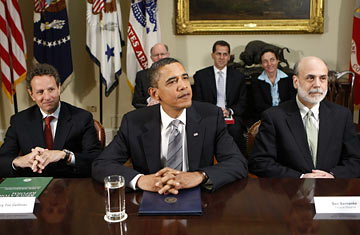
From left, Treasury Secretary Timothy Geithner, President Barack Obama and Federal Reserve Chairman Ben Bernanke meet with regulators in the Roosevelt Room at the White House
Almost every reference to the financial regulatory plan that was unveiled today by President Obama is prefaced with something along the lines of "the most sweeping overhaul of financial regulation since the 1930s." Obama himself used such language in his speech this afternoon.
The description isn't wrong. The Obama plans would, if enacted, amount to the biggest changes in financial regulation since the 1930s. But don't let this make you think the Obama reforms even approach in significance and forcefulness the changes made back then. In the early days of the Roosevelt Administration, Congress set up the Securities and Exchange Commission and charged it with strictly regulating markets, split banks from investment banks with the Glass-Steagall Act, created the Federal Deposit Insurance Corp., and enacted all manner of other game-changing financial reforms. It's not just that the Obama reforms are less ambitious than those of the Great Depression. They're also inspired by a very different interpretation of what went wrong. In the 1930s the overarching idea was that Wall Street had been very naughty and needed to be put in the penalty box — for good. This time the animating spirit behind the changes seems to be that regulators let a lot of things slip through the cracks, so there's a need both to give them some new tools and exhort them to do better.
There are some perfectly good reasons for this difference in approach: In the early 1930s, Congress was confronting a failed and mostly unregulated financial system. What we have now is a financial system that has been prevented from failing by government actions, and already has regulators swarming over many, but not all, of its parts.
The result is a reform plan that's clearly had a lot of thought put into it, and responds to many of the most obvious failings of our financial regulatory setup, but doesn't really change the way the financial game is played. The Federal Reserve would have more power to snoop around financial institutions that it thinks pose a systemic risk, the FDIC would get the power to take over and wind down non-banks, most over-the-counter derivatives would be forced onto exchanges, and capital requirements would be ratcheted up across the financial system. But the current alphabet soup of regulatory agencies would remain mostly in place, and there will apparently be no effort to break up too-big-to-fail financial institutions or cordon off risky financial activities from essential ones (as the Glass-Steagall Act attempted to do).
The one really big, bold change envisioned in the Obama plan is the creation of a Consumer Financial Protection Agency that would take over the drafting and enforcement of consumer financial rules from the banking regulators. This is a move proposed two years ago by Harvard Law School professor Elizabeth Warren, who is now chairman of the panel overseeing the Treasury Department's bank bailout. "It is impossible to buy a toaster that has a one-in-five chance of bursting into flames and burning down your house," Warren wrote in the journal Democracy in 2007. "But it is possible to refinance an existing home with a mortgage that has the same one-in-five chance of putting the family out on the street."
Bank regulators were willing to countenance those kinds of risks because their main charge was keeping banks healthy and profitable. A separate consumer agency would presumably be much tougher. It would also probably curtail financial innovation and keep some Americans from getting loans — as banking groups, who like the consumer agency idea least of all the Obama proposals, are already arguing. But that's not necessarily a bad thing. It's hard to imagine the financial crisis of the past two years being anywhere near as damaging if lenders had simply been banned from extending home loans to people who couldn't afford to repay without either selling their houses or rolling over into new loans. So maybe this one bold change will be enough.
